Popups are the new startups
Now you can materialize your cloud community into the real world.
Network State Conference 2025 was a smash hit. Thousands of attendees, millions of followers, and billions of dollars heard about starting new societies from the Internet. We had the CEO of Binance and the CEO of Coinbase, the founder of Ethereum and the Solana Foundation, the government of Singapore and the government of the UAE, all talking about startup cities, tech hubs, and in-person communities.
Watch this to see the sheer size of the crowd:
All talks are now available for free here, and you’ll see a full recap at the bottom of this post. But before I cover what our speakers covered, I want to explain why we organized the Network State Conference in the first place…and why we think it’s so important to move from digital communities to physical societies.
From Digital to Physical
The old world is fading, and the new world struggles to be born; now is the time of popups.
Yes, that’s a joking paraphrase1 of Gramsci. Yet it’s also serious. Because the old postwar world is fading rapidly, as you can see from every headline on political chaos, military pullback, and monetary collapse. At the same time, the new world struggles to be born, because it’s not yet obvious what comes next.
One answer, half2 the answer at least, is that the successor to the rules-based order of America is the code-based order of the Internet. The rationale is that (a) the Internet is the only thing with global economic scale comparable to China and has also (b) given birth to an entirely new digital legal system that already de facto manages ~99% of global communications and transactions…yet is (c) still somehow largely invisible3 in the discourse despite its ubiquity.
That invisibility of the Internet is why so many struggle to see the code-based order as the successor to the rules-based order. The typical riposte is that the Internet just isn’t even a place4…so how could it possibly succeed the physical part of the old world?
The riposte to that riposte is to note that Christianity also isn’t a place, yet there are Christian5 places…because there are churches, cathedrals, and entire countries with the cross on the flag. Similarly, yes, the Internet itself is not a place, but there are Internet places…like startup offices, tech conferences, datacenters, and entire countries with Bitcoin as the national currency.
That means the cloud can take physical form. And that brings us to popups.
From Popup to Permanent
We define a popup as an internet community that temporarily meets up in the physical world, and terraforms it in some fashion while doing so. Concrete examples include:
And the dozens of popups featured at the Network State Conferences
Here are some photos of popups. Starting from the top left and proceeding row-wise, that’s Cursor Cafe, Anthropic’s Claude Hat popup in NYC, AngelList’s Founders Cafe, Coinbase Basecamp, the ZCash Network School popup, and finally Ethereum’s Zuzalu:
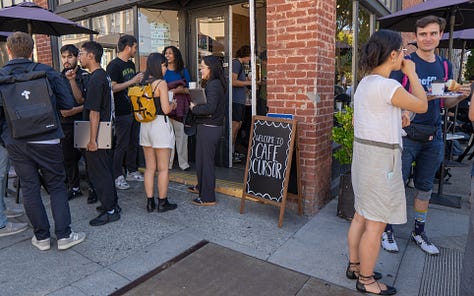
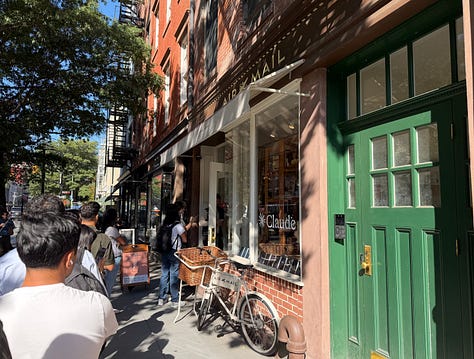
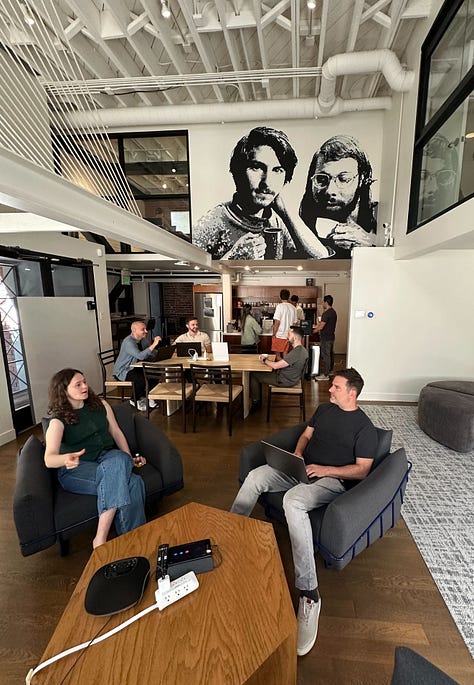
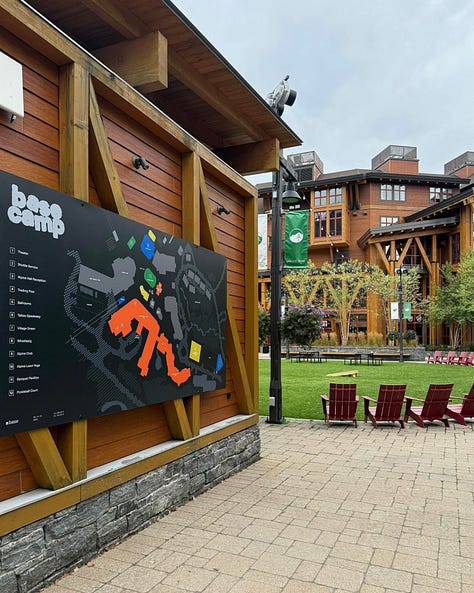
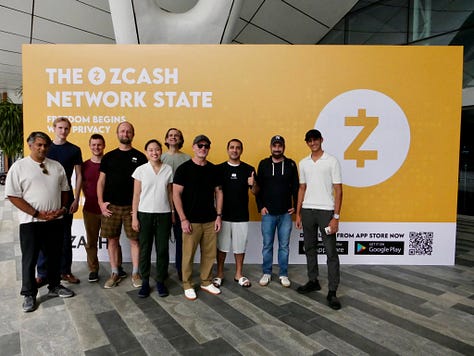
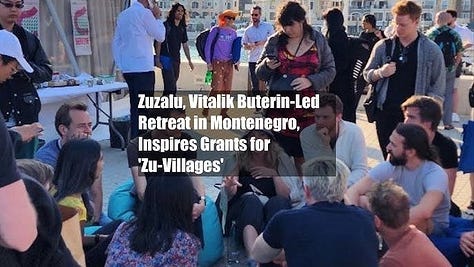
Obviously, the term popup implies something evanescent. But if it’s successful, you can go from from a popup (which is a physical prototype) to a permanent (which is a production deployment). To make this concrete, below are photos of permanents, starting with the Tesla Diner, our own Network School, then SpaceX’s Starbase, and finally the new Solana Economic Zone in Kazakhstan.
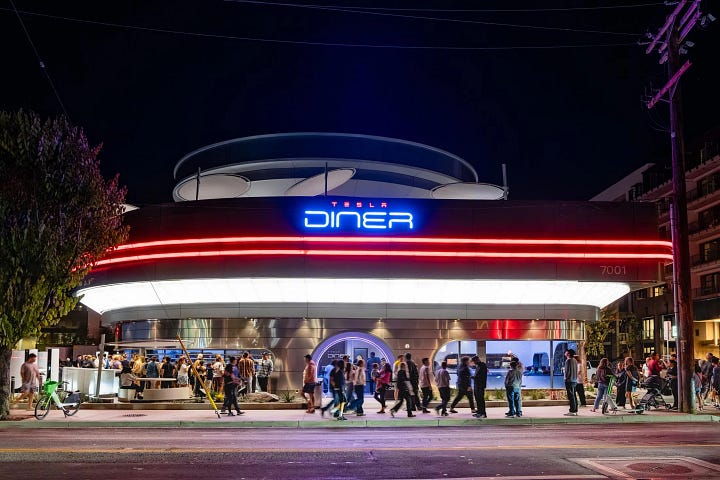
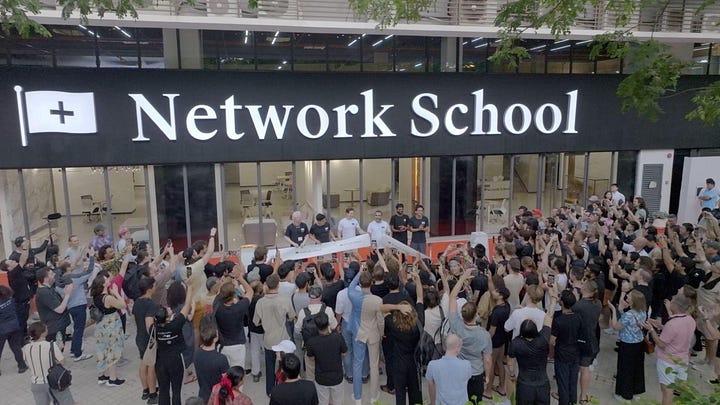
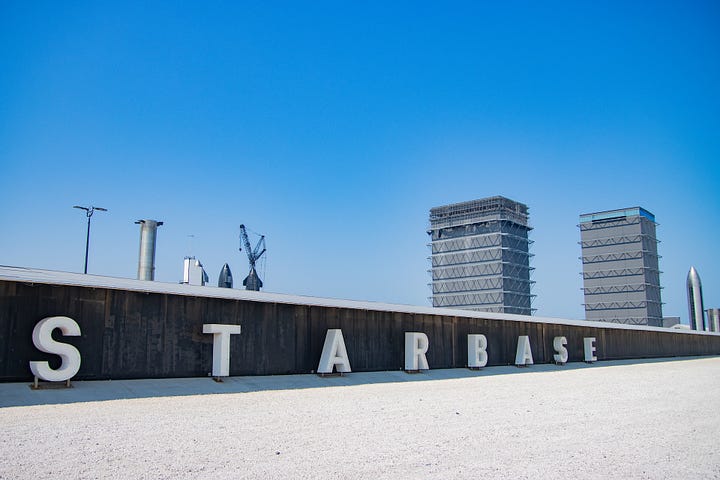
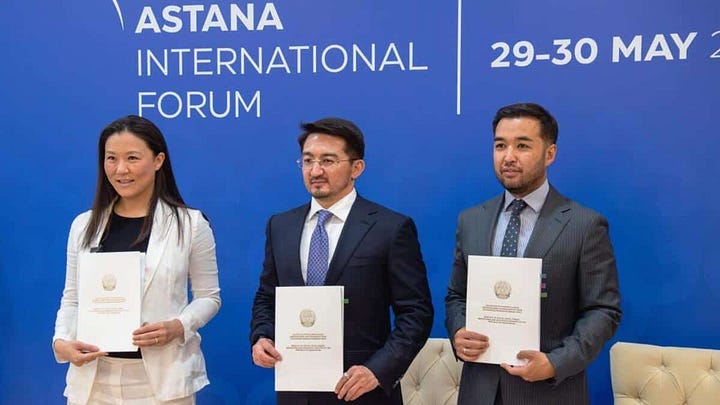
Moving from popup to permanent may mean graduating from leasing real estate to buying it, much like starting on Heroku and eventually moving to your own datacenters. And it may even mean negotiating with governments for a measure of diplomatic recognition, as the Solana network state just did.
Seen in this light, a popup is similar to a startup, with a roadmap for starting up small but eventually scaling up big. It’s the third6 kind of thing: from internet company to internet currency to internet community. And it may also be the next big thing, at least according to no less than Ben Horowitz, cofounder of Andreessen Horowitz.
And that leads us to the Network State Conference.
Network State Conference 2025
This year’s Network State Conference was huge, with thousands of in-person attendees and more than a million views online. Our primary goal was to demonstrate that it is now politically, financially, and technically feasible to materialize your internet community into a friendly in-person community.
And I think we succeeded in this aim! We put tiny communities on stage alongside Vitalik Buterin, Richard Teng, Ben Horowitz, Brian Armstrong, Amjad Masad, Ranveer Allahbadia, Nas Daily, Noah Smith, Arthur Hayes, Bryan Johnson, Andrew Huberman, and the governments of Singapore, Dubai, Abu Dhabi, and El Salvador. In doing so, we established that there’s now an entire ecosystem now available to support you socially, politically, and financially as you turn your digital community into a physical society.
Of course, it’s rare to have so many prominent speakers at a single conference, or to see attendees glued to their chairs long into the evening. I think the reason is that Network State is not about selling a product. We are instead advocating an idea: the idea that a better world is possible, that you too can found or find your ideal community, and that we can take the once-functional parts of the 20th century rules-based order and rebuild them in a 21st century code-based order.
The Recap
All right. Now to the recap.
The core of each year’s Network State Conference are the talks by physical startup societies, both popups and permanents. We also feature governments, investors, coins, companies, services, writers, and creators with an interest in startup societies. Below we’ve organized speakers by category, with a link to their full talk on YouTube. We’ve also included a few relevant talks from previous years’ conferences (2023, 2024, 2025) and the Network State Podcast.
Governments
🇸🇬 Singapore (Jacqueline Poh): Jacqueline Poh runs JTC, which is Singapore’s $40B real estate arm. They’re recruiting global technologists to relocate both to Singapore and to the new Johor-Singapore special economic zone.
🇦🇪 Abu Dhabi (Wai-Lum Kwok): Wai-Lum runs Abu Dhabi Global Markets (ADGM), the financial regulator that created pro-crypto rules early on. They now run regulatory sandboxes where global companies can work with Abu Dhabi prior to full regulatory approval.
🇦🇪 Dubai (Rashid Mohammed, Expo City): Rashid is CTO of Expo City Dubai, an exhibition site that Dubai converted into a startup city. They’re building an open city OS for startups to test urban tech.
🇸🇻 El Salvador (Stacy Herbert, Bitcoin Office): Stacy directs the National Bitcoin Office of El Salvador. The country now offers streamlined AI rules, 180-day tourist visas, and pro-business/tech regulations to bring in global founders.
🇵🇼 Palau (Surangel Whipps Jr, President). The President of Palau spoke to Balaji about embracing crypto and implementing rns.id for a new kind of state-backed digital ID card, which has already been issued to figures like Tim Draper and Vitalik.
🇲🇭 Marshall Islands DAO (Adam Miller). Adam Miller’s talk covers the new Marshall Islands DAO law, which is perhaps the best legal framework in the world for crypto-native entities, AI agents, and DAOs. More than 250+ of these entities have already been registered via midao.org.
Investors
Naval Ravikant. Naval is one of the world’s most famous investors. In his fireside chat at Network State Conference 2024, Naval discusses the right to exit, the fractal frontier, and how technology enables people to opt into new forms of political and social organization.
Andreessen Horowitz (Ben Horowitz): Ben Horowitz is cofounder of Andreessen Horowitz, the world’s largest venture capital firm with $46B under management. A16Z is now interested in funding internet communities as the third step after internet companies and internet currencies.
Polychain (Olaf Carlson-Wee): Olaf founded the first crypto hedge fund, now a multibillion dollar firm named Polychain. He sees network states speed-running the path from bare land to Dubai and Singapore, given the >100X increase in internet-native youth from 1995 to 2010.
AngelList (Avlok Kohli): Avlok is CEO of Angellist, a platform with $100B+ in assets. Influenced by Network State book, AngelList recently opened a Founders Cafe in San Francisco. He thinks of popups as the natural next step for tech.
Dragonfly (Haseeb Qureshi): Haseeb is cofounder of Dragonfly, a multibillion dollar crypto hedge fund. He views crypto as “laboratories of democracy” for ownership experiments, and spoke about the mechanics of token distribution from proof-of-work to points.
YCombinator (Garry Tan). Garry Tan is CEO of YCombinator, which has seeded companies with $600B+ in combined portfolio value. In this talk from Network State Conference 2023, Garry discusses SF’s many problems (drugs, cleanliness, education, crime) and noted that only some are due to elected officials. He recommends building parallel systems—particularly in media and academia—to replace the dysfunctional-and-unelected parts of the legacy system, thereby complementing voting by building as a civic duty.
Animoca (Yat Siu): Yat Siu’s Animoca manages 600+ portfolio companies with billions in assets. He views internet communities as more like peer-to-peer networks than traditional hub-and-spoke companies, and wants to build the (productive) GDP of network states as opposed to simply boosting their (financial) market cap.
Maelstrom (Arthur Hayes). Arthur Hayes is the self-made billionaire cofounder of BitMEX and Maelstrom, and a well-known writer. In this fireside, he discusses his new stem cell clinic, on the 80-year cycle forecasted in the Fourth Turning, and why he advises you to get your Bitcoin and get out.
1517 Fund (Michael Gibson and Danielle Strachman). Michael and Danielle are cofounders of the Thiel Fellowship. They spoke about shorting the higher education bubble through VC, and returning $219M on just $18M invested.
Pronomos (Patri Friedman). Patri created the seasteading movement and is now focused on new cities. Through his Thiel-backed fund Pronomos, he’s an early investor in Prospera and Alpha City.
Startup Societies (Popups and Permanents)
Infinita (Niklas Anzinger). Infinita is a longevity network state, an L2 built on top of Próspera’s L1. It has Minicircle gene therapy, and it’s hosting the new Rejuvenation Olympics.
Prospera (Erick Brimen, Lonis Hamaili). In talks from 2024-2025, Erick and Lonis present Prospera’s physical plant and its governance-as-a-service model, now with 300+ companies and 2000+ paying Prosperians.
Culdesac (Ryan Johnson). Ryan is the cofounder of Culdesac Tempe, a car-free, mixed-use community in Arizona. The city offers residents a variety of mobility options like light rail, ride sharing, electric bikes, and autonomous vehicles, with integrated retail and residential spaces to promote walkability.
Edge City (Janine Leger, Timour Kosters). In talks from 2024-2025, Janine and Timour describe the origins of Edge City and how it’s now held seven pop-ups across four continents, with 10k+ attendees and $1M+ in grants, and multiple permanent sites on the way.
Esmeralda (Devon Zuegel). Devon spoke about Edge Esmeralda, a pop-up city inspired by the Chautauqua movement.
Crecimiento (Juan Benet). Juan Benet’s talk outlines his work on Crecimiento, and how Argentina might become a global crypto leader by fostering hundreds of tech startups.
Zu Georgia (Veronica Schrenk). Veronica’s talk covers how Zuzalu evolved from a single gathering into a decentralized movement, with spin-off experiments like ZuVillage Georgia pushing forward new ideas.
Zu Thailand (Nicole Sun). Nicole helped organize Zuzalu and then built ZuThailand, a pop-up city experiment inspired by the first Zuzalu event.
Oz City (Olly Kovalieva). Olly created Oz City, a popup for AI and web3 builders, with seventy founders building together in Argentina before Devconnect.
Nuanu (Sergey Solonin). Sergey built Nuanu, a creative community in Bali focused on art, entrepreneurship, and co-living.
Threefold (Florian Fournier). Florian presented Threefold as a foundation for building sovereign digital communities.
Arc City (James of Arc). James is building Arc, the first L2 at Network School. The aim is to gather a group to eventually build their own charter city.
Forma (Farhaj Mayan). Farhaj created Solana Economic Zones in Kazakhstan and Georgia. Kazakhstan in particular has now launched a national crypto reserve and announced a crypto city.
Zuitzerland (Isla Munro-Hochmayr). Isla founded Zuitzerland, an Ethereum-centric popup focused on d/acc. Their token economy is based on Switzerland’s 700-year governance history.
Liberland (Vít Jedlička). Vít is a Czech-born politician and the president of Liberland. He shares his experience of trying to build a country in unclaimed land between Serbia and Croatia.
Ipe City (Jean Hansen). Jean Hansen is the founder of Ipé City, a popup city for techno-optimists in Brazil. He discusses their recent agreement to build a special economic zone in Florianopolis.
Alpha City (Bradford Cross). Bradford is CEO of AlphaCity and managing partner at Pronomos. He gives an overview of the startup cities they’re architecting in Africa.
Bitcoin Sranam (Maya Parbhoe). Maya Parbhoe of Suriname talks about why it’s smart to work with small countries, and how she’s been working to make Bitcoin the national currency of Suriname.
Fractal NYC (Alexander Grintsvayg). Grin is the founder of Fractal Boston, which began in NYC. It’s a community of friends living/working together, with 1000+ in NYC, and now expanding to Vancouver, Porto, and Geneva.
Wagon Box (Paul McNiel). Paul McNiel is the founder of the Wagon Box, a 20 acre property in the Wyoming mountains, that hosts events and retreats with a Christian/classical culture focus.
NOMAD (Zach Milburn). Zach has built NOMAD, a worldwide network of villages for remote workers. He’s also architected a unique modular unit at nomad.homes that can be built and shipped anywhere.
Vibecamp (Brooke Bowman). Brooke organizes VibeCamp, a volunteer-driven event that transforms online connections into co-created in-person communities.
Charter Cities (Mark Lutter). Mark explains the idea of charter cities, highlighting their role in economic development, historical examples, and the ongoing efforts of the Charter Cities Institute to foster new city projects worldwide.
Plumia (Sondre Rasch). Sondre’s Plumia is an aspiring internet nation with a social safety net and a digital passport.
Aaron Renn (Christian Network States). Aaron Renn, founder of American Reformer, speaks about how Christians can build startup societies and network states to congregate with others that share their values.
Cover (Alexis Rivas). Alexis Rivas of Cover talks about hyperdeflating the cost of homes via rapid modular construction.
Coins
Ethereum (Vitalik Buterin, Founder). In this fireside, Vitalik discusses the progress of Zuzalu, a family of Ethereum-aligned popup cities, the idea of d/acc, and the contrast between geographically central startup societies (“embassies”) vs geographically remote cities (“monasteries”).
Solana (Anatoly Yakovenko and Raj Gokal, Cofounders). Anatoly explains how Solana is building a parallel, decentralized financial system that outperforms traditional finance in efficiency, cost, and composability. Raj highlights how the Solana stack empowers the creation of network states by enabling communities to build and govern themselves.
Solana Foundation (Akshay BD, CMO). Akshay explains how he scaled Solana globally in the physical world, drawing on his experience at Uber.
Base (Xen Baynham-Herd). Xen Baynham-Herd, lead of Base Global Growth, describes Coinbase’s progress towards a Base Network State.
Telegram TON (Veronika Kapustina, CEO TON Strategy). Veronika Kapustina, CEO of the new Telegram TON Strategy Co, outlines TON’s plans for a global superapp that can create physical communities and fund space travel.
Zcash (Zooko Wilcox, Founder and Josh Swihart, Electric Coin Company). Zooko is the cofounder of Zcash, and explains what principles allowed Zcash to last for a decade. Josh Swihart is the CEO of Electric Coin Company, which helps develop Zcash. He discusses Zcash’s huge week prior to the conference, with ZEC hitting a “god candle”, with enormous energy finally flowing into unstoppable private money.
Eigenlayer (Sreeram Kannan, Founder). Sreeram Kannan, cofounder of EigenCloud, spoke about how verifiable AI enables smart governance.
Companies
Binance (Richard Teng, CEO). Richard Teng is the CEO of Binance. In this fireside chat with Balaji, he discusses why the Internet becomes the world’s largest capital market and why small countries love cryptocurrency.
Coinbase (Brian Armstrong, CEO). Brian Armstrong, CEO and cofounder of Coinbase, talks to Balaji about their joint history of success, and tells the audience that anyone working on real cryptocommunities and network states should build them on Base and reach out to Coinbase Ventures.
Replit (Amjad Masad, CEO). Amjad Masad is cofounder and CEO of Replit. In this fireside, Amjad and Balaji talk about their shared interest in educating the developers of the developing world, the history and future of Replit, and how the physical world is becoming more programmable.
Gemini (Cameron and Tyler Winklevoss, Founders). In this talk from 2023, Tyler and Cameron Winklevoss discuss the failures of the SEC, and the successes of red states and foreign states on crypto regulations.
Kraken (Jesse Powell, Founder). Jesse Powell is cofounder and chairman of Kraken, a multibillion-dollar crypto exchange. He discusses parallels between the rise of early crypto and the rise of network states with Balaji.
Farcaster (Dan Romero, Founder). Dan gives an overview of Farcaster’s decentralized media platform, and offers thoughts on how network states can be built on Farcaster’s open protocol.
Catena (Sean Neville, Founder of Catena and Circle). Sean is cofounder of Circle and Catena. In this chat, Sean and Balaji discuss how they worked together to launch USDC, the second largest stablecoin in the world, and now fully legally recognized by major governments.
Synthesis (Chrisman Frank). Chrisman Frank speaks about building a parallel educational system with AI tutoring.
Research Hub (Patrick Joyce). Patrick Joyce of Research Hub talks about decentralizing science and creating incentives for distributed replication.
Henley Global (Dominic Volek). Henley Global shares how to build a portfolio of global citizenships, and how migration trends highlight second citizenships as essential tools for mobility and security.
Writers
Noah Smith (Noahpinion). Noah Smith is the founder of the popular Noahpinion newsletter, with 400k+ subscribers. In this talk, he describes his idea for building a New Hanseatic League, a network of states. See also his recent Substack post on the topic.
Tomas Pueyo (Uncharted Territories). Tomas Pueyo runs a popular newsletter called Uncharted Territories with 100k+ subscribers. Here, he speaks about the pending end of the Western nation state.
Glenn Greenwald. Famous independent writer Glenn Greenwald speaks on digital privacy, internet censorship, and the decentralized technology that could deliver us a free and open internet.
Niall Ferguson. Bestselling author and historian Niall Ferguson reflects on the changing world order in the internet age, debating the question of whether states that have waged wars against gold and oil can effectively wage war against Bitcoin.
Ayaan Hirsi-Ali. Author Ayaan Hirsi-Ali shares her journey leaving Somalia to seek asylum in the Netherlands, and talks about why building new communities outside traditional systems is essential for freedom.
Tyler Cowen (Marginal Revolution). Tyler talks about Emergent Ventures, Marginal Revolution University, and radically slashing the overhead associated with academic grants.
Alana Newhouse (Tablet Mag). In this 2023 talk, Alana introduces the idea of brokenism as the true American political axis. Her idea is that the real debate isn’t between the left and right, but between those still invested in Western institutions, and those who think they’re broken and want to build anew.
Ashley Rindsberg (Gray Lady Winked). Ashley Rindsberg’s book details how the New York Times Company has faked the news for more than a century, from Stalin’s USSR through Castro’s Cuba all the way to the present day.
Bruno Macaes (World Builders). Bruno Macaes is former Minister of European Affairs for Portugal and a bestselling author. In this talk, he notes that geopolitical power is “God Mode” in the video game sense, the ability to change game variables. He defines a superpower as one that can run such a video game, and relates this idea to the concept of a network state.
Kathleen Tyson (Multicurrency Mercantilism). Kathleen says the alternative to the dollar actually already exists: it’s the dollar and all other currencies. She presents a series of graphs that show the multi-currency world is already here, with the dollar down ~50% vs gold.
Avik Roy (FREEOPP). Avik Roy, founder of FREOPP, examines how repeated expert failures have shaped public policy and explains how network states can harness these lessons to create more resilient societies.
Parag Khanna (AlphaGeo). Parag Khanna speaks about the age of global mobility and digital nomadism.
Murtaza Hussain (Drop Site). Murtaza Hussein is a writer who covers surveillance, privacy, Bitcoin, and decentralized media. He sees network states as inevitable, given that nation states are now lumbering like empires before them, and given that networks in particular can guarantee inalienable rights.
Pascal-Emmanuel Gobry (Catholic Network State). Pascal-Emmanuel Gobry, founder of PolicySphere, spoke about the Catholic Church as the original network state.
Rajeev Mantri (A New Idea of India). In this 2024 talk, the author of A New Idea of India assesses India’s rapid upward trajectory with technologies like UPI, and previews the next 25 years.
Michel Bauwens (P2P Foundation). Michel Bauwens is the founder of the P2P Foundation. He speaks about how web3 can be used to regenerate local communities and strengthen the digital commons.
Hive Mind (Garrett Jones). Garrett Jones, economist and author of Hive Mind, explains why a nation’s collective intelligence drives long-run prosperity more than individual intelligence.
Creators
Bryan Johnson (Blueprint) (2024 fireside, 2024 talk, 2025 talk). Bryan Johnson, founder of Blueprint, is an anti-aging and longevity pioneer. Balaji sits down with Bryan in 2024 to compare how their two distinct paths somehow led them both to have a very similar conclusions. Later, in 2025, they flesh out a proposal for a longevity-focused network state.
Pieter Levels (NomadList). Levels is a self-taught dev who has built and launched 40+ startups, including highly successful projects like Nomad List. In this fireside, Pieter explains how he runs multiple companies as a solo founder, why finding your tribe matters, and what the future holds for digital nomads.
Andrew Huberman (Huberman Lab). Huberman discusses what the ideal Huberman community materialized into the physical world might look like, and why that’s better than just building a device.
Nuseir Yassin (Nas Daily). The founder of Nas Daily has 10M+ followers worldwide, and joined Balaji at the 2025 Network State Conference to discuss content creation and community building in today’s social media environment.
Ranveer Allahbadia (The Ranveer Show). Ranveer is the founder of India’s largest podcast, with 10M+ followers worldwide. He joined Balaji at the 2025 Network State Conference to discuss how he built a global media following from nothing, survived being cancelled, and is refocusing on community.
Rudyard Lynch (WhatIfAltHist). Rudyard (aka Whatifalthist) has 730k+ followers on YouTube. In this 2024 chat with Balaji, he discusses the sheer scale of the internet, notes that it’s as significant as any shift in human history, and talk about why that’s likely to rework the state.
Beff Jezos (e/acc). In this 2023 talk, the cofounder of the now-successful effective acceleration (e/acc) movement outlines the alliance between AI acceleration and crypto decentralization.
Punk6529 (NFT Network States). Punk6529, a well-known NFT investor with 400k+ followers, drops virtually by to give three quick ideas on network states.
Molson Hart (Can we Build Hardware if China Wins?). In this 2024 talk, Molson of Viahart asks the hard questions about how to build hardware in the world where China wins.
Farb Nivi (Minicircle). Farb Nivi explores his personal health journey, his successful experiment with Minicircle, and why radical longevity research could reshape the future of health.
Codie Sanchez (Blue Collar Network States). In this 2023 talk, Codie Sanchez talks about making the network state accessible to everyday people and blue collar workers in particular, to build the largest possible political coalition.
Wow! OK, that’s sovereign governments, billion dollar funds, billion dollar coins, billion dollar companies, creators with millions of followers, famous public intellectuals, and dozens of startup societies…all of whom are now interested in the broad idea of bringing online communities into the physical world.
Of course, our short recap of each talk doesn’t fully convey the energy of the event. So if you want to see the full videos, go look at the Network State Conference playlists for 2025, 2024, and 2023.
From URL to IRL
Now let’s recap the recap.
Clearly, quite a lot of successful people now have an interest in startup societies. But one thing I want to stress is that anyone can now start a startup society, with minimal resources, including you. The point of having all these prominent folks at the conference is just to establish that there is now social, political, and financial support for you to materialize your ideal community7 in the physical world.
And there’s also now a process: begin with a popup, and get your online friends in the same place at the same time for an extended duration. If that goes well, the next step is to crowdfund a permanent startup community. And from there, the sky’s the limit, because you’re bootstrapping from the cloud.
Ultimately, the goal of the network state movement is to help create 1000+ friendly internet communities around the world that anyone can choose from, from vegan villages to Catholic cities to biotech boroughs. To allow you to find or found your ideal society in the physical world. We think of this as the third kind of thing: after internet companies and internet currencies, we finally have internet communities.
The next startup is a popup.
The original was: “The old world is dying but the new world struggles to be born; now is the time of monsters.” Also: yes, Gramsci was a commie, but they do sometimes have good lines. Given that communists support the abolition of private property, we should all feel free to repurpose their phrases as we see fit.
The other half is in this podcast I did with Peter McCormack.
As noted here, despite their enormous scale, China and the Internet are nevertheless somehow invisible. China because it’s overseas, and the Internet because it’s in the cloud.
It goes something like this: “the Internet isn’t a place, techbro! You’ve been playing too many video games. Let me explain the real world, which you seem to not understand. People still exist, land still exists!” This type of objection usually comes from someone who thinks the network state as a concept is entirely about the digital world. In reality it’s about cloud first and land last — but not land never. The whole point is to materialize the internet into the physical world. Popups really make that concrete.
And after the fall of Rome, what endured? Christianity. Similarly, if Dalio, Turchin, Elon, the Sovereign Individual, and the Fourth Turning are right, if the debt is indeed unfixable, if the West is unfortunately headed for a fall, what would endure? The Internet.
One might argue the Internet has already been taking physical form. After all, how does an internet popup differ from something like Apple stores, Meta datacenters, Google offices, or Amazon warehouses? While I’d agree those are indeed relevant precursors, the key difference is that popups are community-oriented rather than corporate-oriented.
For example: the AngelList userbase is welcome to sip coffee at their Founders Cafe, the Anthropic community was invited to get a hat at their Claude popup, and the Base developers materialize in person at Coinbase’s Basecamp. By contrast, Amazon isn’t really set up to welcome Amazon users at their warehouses, and even Apple is focused mainly on selling laptops at its stores rather than welcoming its audience to hang out with other Apple users.
There are various phrases for this. On Farcaster, they call it going from URL to IRL. On X, Noah Smith once noted that the Internet was once an escape from the real world, but now the real world is an escape from the Internet. While I do love the Internet, the underlying logic is that digital versions of anything are ubiquitous and cheap, which means the physical is now a premium product. We’re actually seeing the reverse of the “digital divide” of the 90s; the hard part isn’t getting people online, but getting communities offline.





this was one of the best conferences i've ever attended 🙌
will be going to Forma's pop-up in Tbilisi next month.
Best conference of the last few years, if not ever. Felt like the old days of crypto conferences, where the signal to noise ratio was through the roof! 💪
Well done 👏